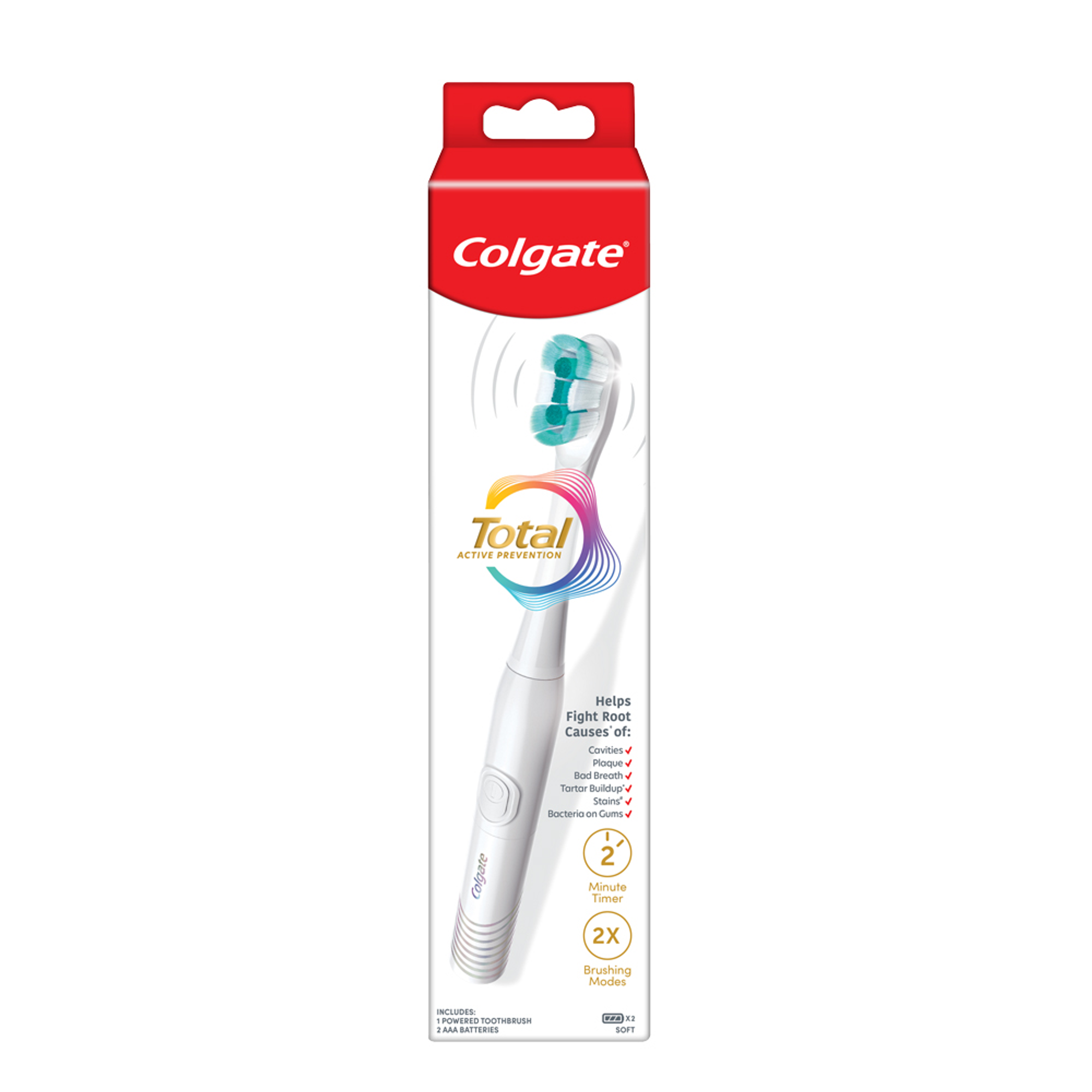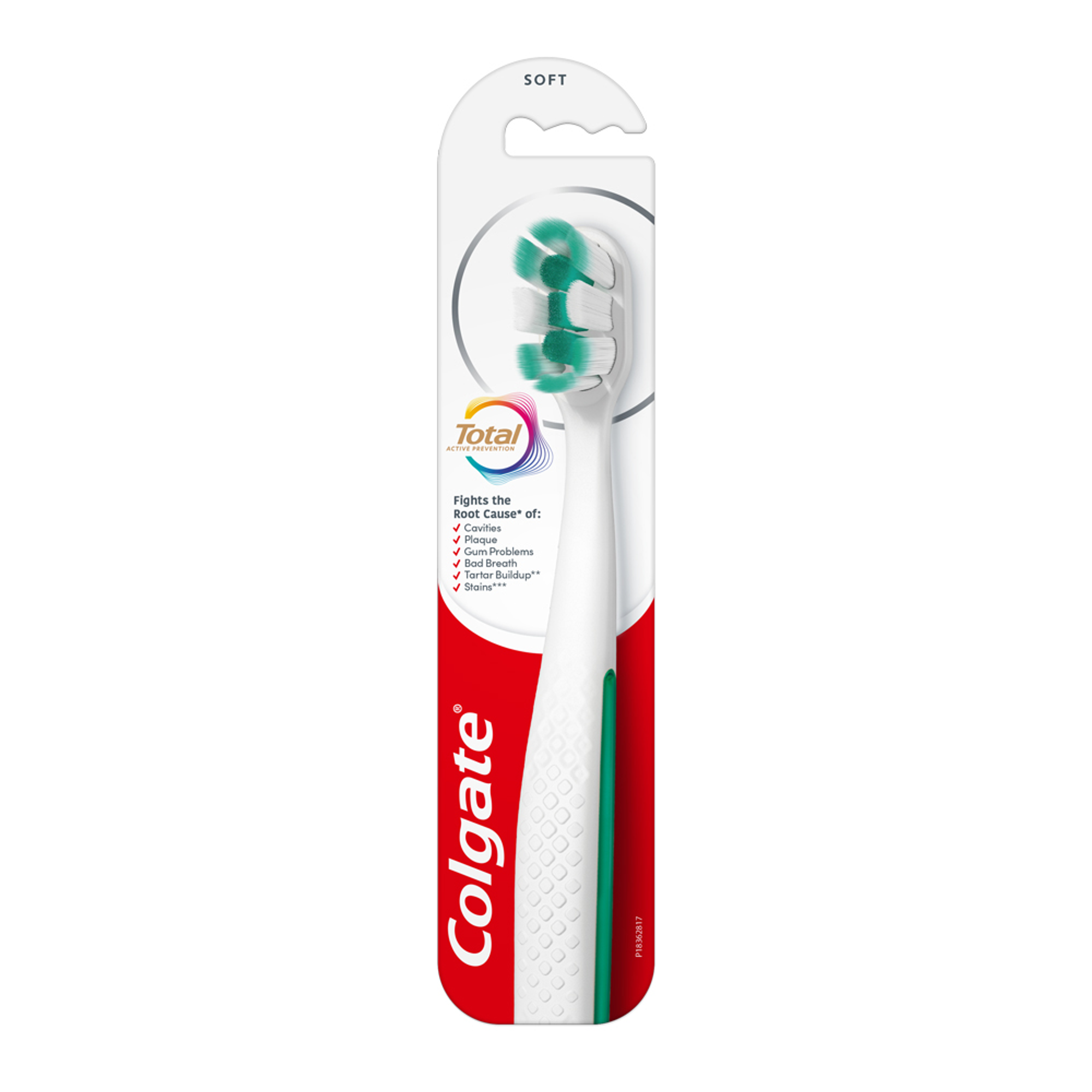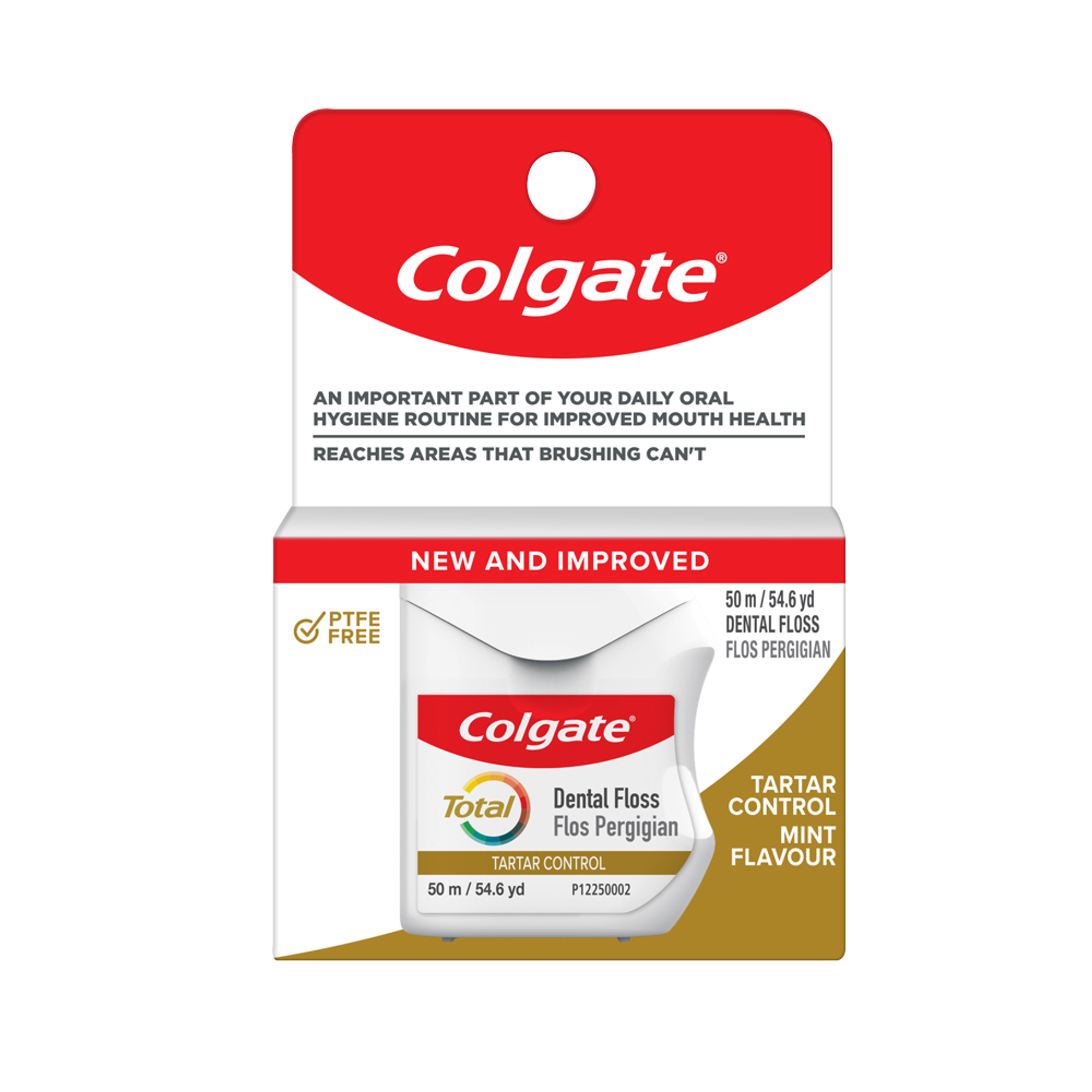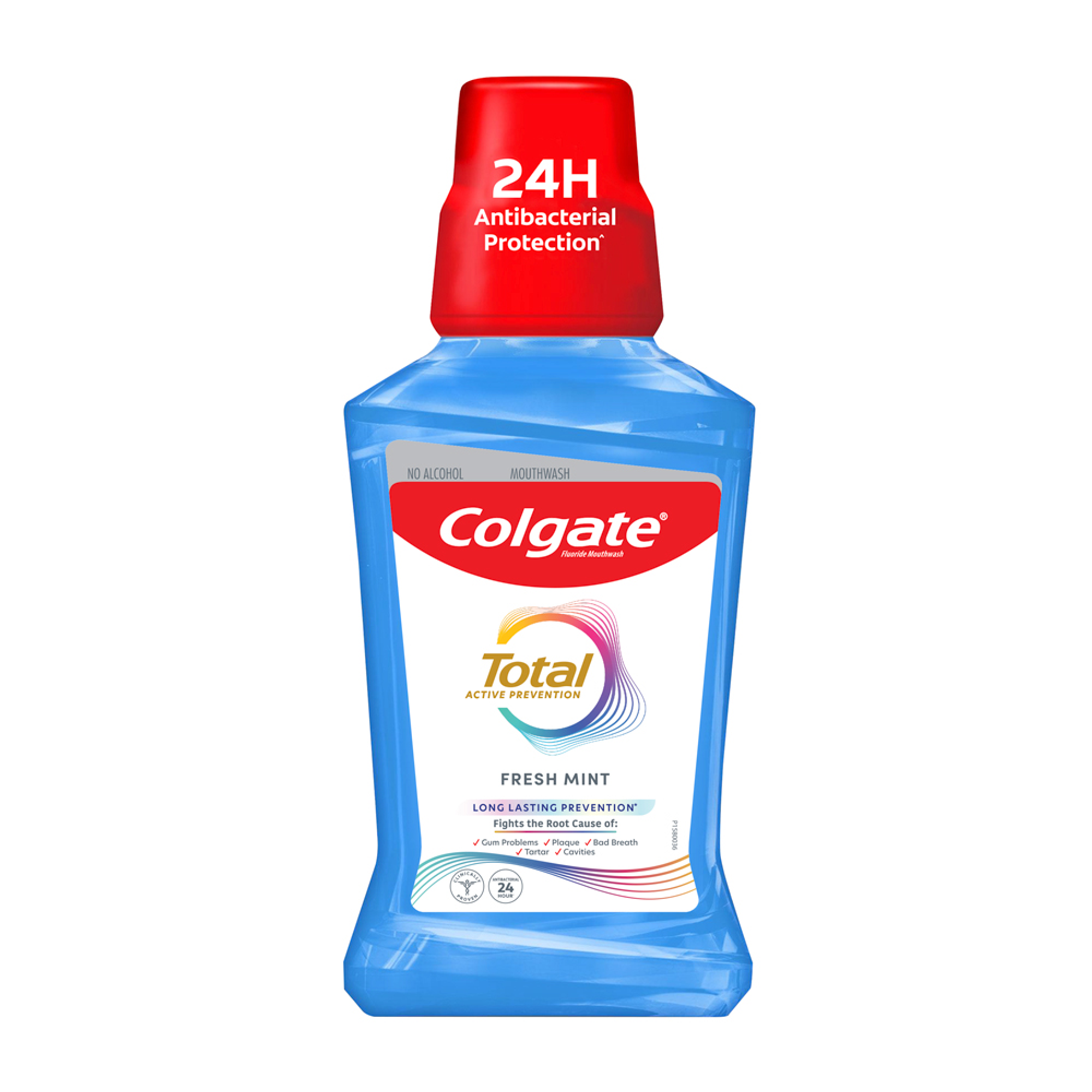Read on to understand the different measures you can consider to support gum health. Until your dental appointment, they can help as a bleeding gums remedy to soothe discomfort temporarily. Continue reading to learn more.
1. Improve Your Oral Hygiene Routine
If you want to know how to stop bleeding gums, watching your oral hygiene is the first step. Plaque buildup along the gumline is the most common cause of bleeding gums. If not removed by daily brushing and flossing, this sticky biofilm of bacteria builds up and hardens to tartar which needs professional cleaning. Plaque and tartar irritate the gums, causing them to bleed and sometimes, swell (gingivitis). Left untreated, it can develop into advanced forms of gum disease (periodontal disease) that lead to receding gums and even tooth loss.
The best way to reduce plaque buildup and lower the risk of gum bleeding is through good oral hygiene. It involves brushing twice daily, flossing once and rinsing with a mouthwash. Regular dental checkups also help enhance gum health and remove plaque deposits that escape your oral care routine. How to cure bleeding gums, you might ask? Besides dental hygiene, consulting a dentist is important to address the root cause and get the right cure for bleeding gums.
2. Use Fluoride Toothpaste
If you are worried about how to stop gum bleeding, paying attention to your oral care staples is essential. Ordinary toothpaste may not be effective at fighting the common cause of bleeding gums like plaque. Dentistry recommends using fluoride toothpaste, as it helps protect your teeth and gums from plaque. Its antimicrobial action can inhibit harmful bacteria that promote plaque buildup. Besides, fluoride strengthens tooth enamel and helps resist cavities. Thus, while finding out how to stop gums from bleeding, including fluoride toothpaste in your daily routine benefits you in several ways.
3. Rinse With Saltwater or Antiseptic Mouthwash
A saline rinse or an antiseptic mouthwash helps keep your teeth and gums healthy. Salt water acts as a natural antiseptic and fights germs that infect the gums. Besides, it can temporarily soothe the irritation and inflammation of the gums. You may consider mixing half a teaspoon of salt in warm water and swishing it in your mouth before spitting it out. If you are wondering how to stop bleeding gums until your dental visit, a saline rinse can offer temporary relief.
A mouthwash with an antiseptic formula also helps. Rinsing daily with an antibacterial mouthwash helps inhibit bacteria responsible for plaque and gum infection. Knowing how to prevent bleeding gums begins with proper dental care through daily brushing, flossing and rinsing.
4. Brush with a Soft-Bristled Toothbrush
While considering how to stop bleeding of the gums, you should also watch the toothbrush and technique you use. Sometimes, gum bleeding can occur due to the hard bristles of the toothbrush or from incorrect brushing. One may presume that firm or medium bristles clean better and deeper. However, harder bristles are likely to irritate the gums more, causing bleeding. Besides, aggressive brushing can injure the soft gum tissues and make them bleed.
In such scenarios, if you are wondering how to cure bleeding gums, adopting the right kind of toothbrush and brushing technique is key. Dentists recommend using a soft-bristled toothbrush as it cleans your teeth and gums thoroughly without causing irritation. Brushing with a soft toothbrush in gentle, circular motions helps avoid irritating your gums.
5. Avoid Smoking & Tobacco Products
Lifestyle habits play a crucial role in dental healthcare. While learning how to stop bleeding gums, watching these habits and making the necessary changes is essential. Understanding how smoking and oral health are related helps you make wise choices. Smoking reduces saliva flow in the mouth. This promotes harmful bacteria that contribute to plaque and gum problems. Tobacco weakens the immune system, making it harder for the gums to fight infections. Avoiding these habits is crucial when you need an effective cure for bleeding gums.
6. Improve Your Diet
Diet plays a major part in keeping the teeth and gums healthy. In some people, gum bleeding may be a result of Vitamin C or Vitamin K deficiencies. Sugary food increases your risk for tooth and gum problems as they promote plaque buildup. While considering how to stop bleeding of the gums, adopting a healthy diet low in sugar and rich in nutrients is important. Instead of banning sugar entirely, limiting consumption and maintaining good dental hygiene is essential. Rinse thoroughly with water after every meal.
7. Apply a Cold Compress
Applying a cold compress is among the popular home remedies to relieve discomfort from gum problems. It helps soothe swelling, soreness and pain temporarily. A cold compress or ice pack helps reduce the inflammation of the gums, which in turn relieves pain. It constricts the blood vessels and numbs the affected area to reduce the swelling. This offers only temporary relief and does not address the root cause. If you want to find out how to stop bleeding gums effectively, consult a dentist to address the root cause.
8. Reduce Sugar & Processed Foods
While seeking a bleeding gums remedy, addressing factors that affect gum health is vital. Cutting down on sugary and processed foods helps improve dental health. These foods promote bacteria and the buildup of plaque. Without good oral care, this can lead to gum infection, swelling, and potential gum disease. Moreover, the bacterial acids attack the tooth enamel, causing tooth decay and dental caries. To reduce such harmful effects of sugar on teeth and gums, limiting its intake is the key. It is a simple step that supports the effectiveness of any bleeding gums cure you consider.
9. Stay Hydrated
Dehydration can cause dry mouth, promoting plaque and making gums more prone to irritation and bleeding. A simple yet effective bleeding gums remedy is to drink water throughout the day to maintain good oral hygiene. Staying hydrated keeps your mouth moist and avoids dryness. It helps with adequate saliva flow in the mouth to wash away food debris and bacteria, helping reduce plaque buildup. While considering how to prevent bleeding gums, proper hydration and oral care are prerequisites.
10. Floss Gently & Daily
Despite good oral care, bleeding gums while flossing can imply incorrect flossing or the use of the wrong tool. Flossing removes plaque deposits between teeth, which can otherwise irritate the gums. While flossing once daily is vital, incorrect flossing or the wrong type of floss can irritate and make the gums bleed. So, if you are wondering how to stop bleeding of the gums, learning how to floss gently using a soft floss or water flosser is key. This is an often overlooked bleeding gums cure when the underlying reason is incorrect oral care techniques and tools.
11. Use a Tongue Scraper to Remove Bacteria
If you want to learn how to stop gums from bleeding, addressing the common cause—plaque bacteria—is crucial. These germs reside not only on the tooth surface and gumline but also buildup on the tongue. This also results in bad breath, apart from plaque formation and gum infection. Scraping and cleaning your tongue daily removes harmful bacteria from accumulating. Pairing this habit with proper brushing and flossing can support healthy gums and teeth.
12. See Your Dentist
If you need the right bleeding gums remedy, consulting a dentist is a crucial step. They can identify the root cause of bleeding gums, whether it is from plaque buildup or underlying health problems. Your dentist may suggest treatments or lifestyle changes that will work as an effective cure for bleeding gums. Regular dental cleanings remove plaque deposits that escape your daily oral care. This prevents gum infections and supports gum health.
Curing bleeding gums requires a mix of good oral hygiene, a balanced diet and regular dental checkups. Brushing twice with fluoride toothpaste and flossing once gently are habits that promote gum health. Moreover, adopting a healthy diet and making lifestyle changes is important. If you’re wondering how to stop bleeding gums, consistency is key. With proactive care, you can ensure healthy gums for a healthy smile.
Frequently Asked Questions
Can bleeding gums cause stomach problems?
Amidst poor oral hygiene, harmful bacteria thrive in the mouth, leading to plaque buildup and gum disease. From the mouth, these bacteria can reach the digestive system, potentially causing stomach problems. It is important to improve dental hygiene and seek prompt treatment for gum disease to prevent such complications.How to stop gum bleeding immediately?
Rinsing with warm salt water, applying a cold compress, and using an antiseptic mouthwash help reduce gum bleeding and soothe discomfort for a while. However, these remedies offer temporary relief and do not address the root cause. Bleeding gums are often an initial sign of gum disease. Consulting a dentist is vital for an effective, long-term cure.What causes gums to bleed when flossing?
Bleeding in the gums while flossing is often due to plaque buildup. In some cases, incorrect flossing techniques and tools or gum sensitivity can make the gums bleed. Flossing gently with soft floss can help.What is the main cause of bleeding gums?
Among the major and the most common causes of bleeding gums is the buildup of plaque along the gumline. It builds up amidst poor oral hygiene. Plaque houses harmful bacteria that infect and irritate the gums, causing inflammation and gum disease.How long do bleeding gums last?
This depends on the underlying cause. Mild bleeding may stop within a few days with proper oral care and changes in lifestyle and diet. However, persistent bleeding of gums can be one of the symptoms of early-stage gum disease and requires consulting a dental professional.














